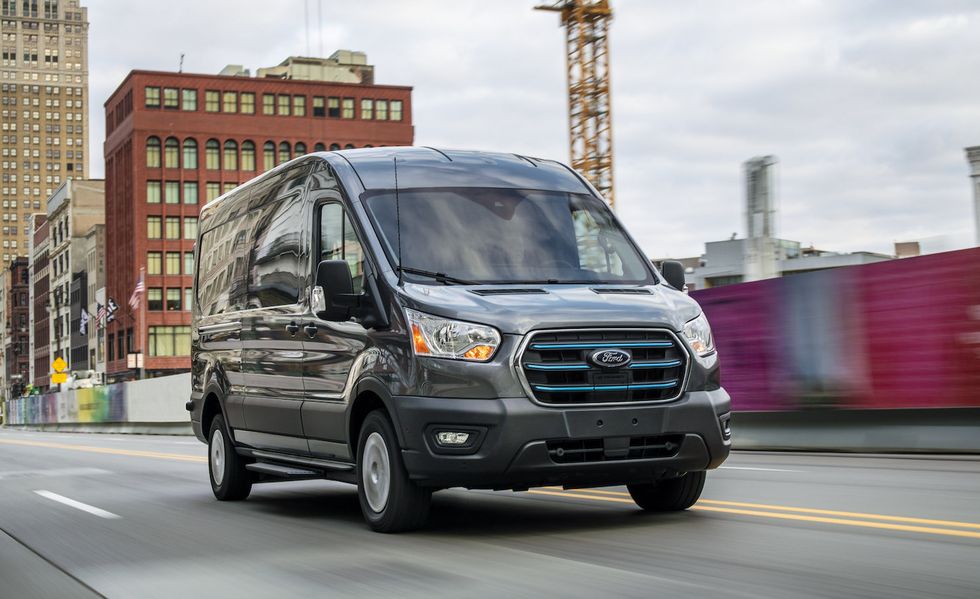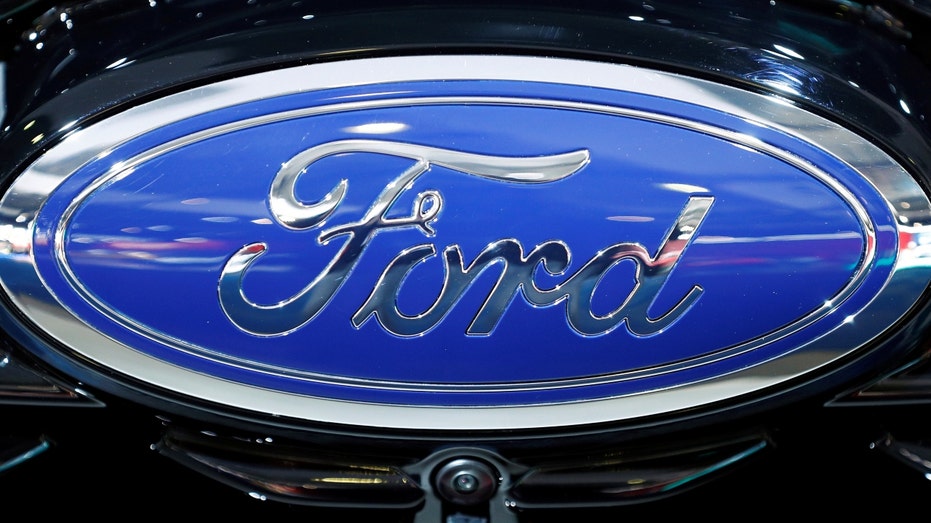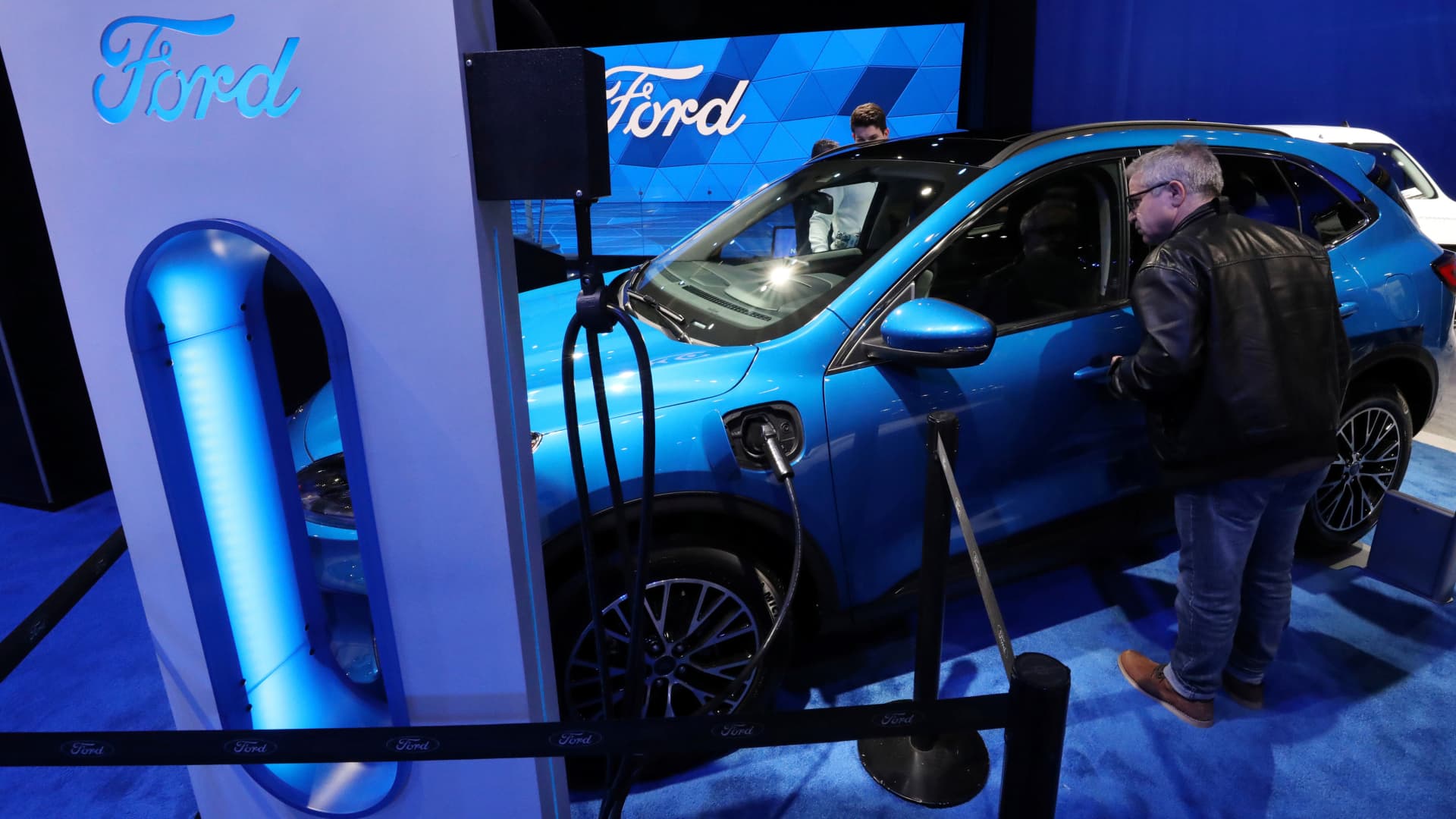Ford is delaying production of a new all-electric large SUV and pickup truck, as it shifts to offer hybrid options across its entire North American lineup by 2030. The three-row SUV at a plant in Canada has been postponed to 2027 from its initial plan of 2025. The next-generation pickup, codenamed ƔT3,Ὠ is being pushed back from late 20
Ford Delays Production of All-Electric SUV and Pickup Truck as it Shifts to Hybrid Options by 2030
Oakville, Ontario, Canada CanadaFord is delaying production of a new all-electric large SUV and pickup truck
The next-generation pickup, codenamed ƔT3,Ὠ is being pushed back from late 20
The three-row SUV at a plant in Canada has been postponed to 2027 from its initial plan of 2025.






Confidence
100%
No Doubts Found At Time Of Publication
Sources
65%
Ford postpones rollout of some new EVs as demand wanes
Fox Business Network Breck Dumas Friday, 05 April 2024 08:59Unique Points
- Ford is pushing back the production launch of its planned three-row electric SUV at its assembly plant in Oakville, Ontario from 2025 to 2027.
- The automaker expects customer deliveries of the all-new electric pickup truck it will manufacture at its Tennessee plant to begin in 2026 and gradually ramp up production to ensure quality after saying last year that production would begin in late 2019.
- Ford lost about $4.7 billion on EVs last year and projects losses in the range of $5 billion to $5.5 billion this year.
- CEO Jim Farley said during Ford's last earnings call that Ford's targets for its next generation of EVs will be for them to be profitable within 12 months of their launch and that it will spend less on making larger EV models by focusing those models on geographies and product segments where the company has a dominant advantage, like trucks and vans.
- Ford is committed to scaling a profitable EV business, using capital wisely, and bringing to market the right gas, hybrid, and fully electric vehicles at the right time.
Accuracy
No Contradictions at Time Of Publication
Deception (30%)
The article contains several examples of deceptive practices. Firstly, the author claims that demand for EVs continues to wane but does not provide any evidence or data to support this claim. Secondly, Ford is delaying production of its planned three-row electric SUV at its assembly plant in Oakville, Ontario from 2025 to 2027 without providing a clear explanation as to why the decision was made. Thirdly, the article mentions that Ford lost about $4.7 billion on EVs last year and projects losses in the range of $5 billion to $5.5 billion this year but does not provide any context or comparison with previous years' profits or losses from other segments of their business.- The author claims that demand for EVs continues to wane without providing evidence or data to support this claim.
Fallacies (70%)
The article contains two fallacies: an appeal to authority and a false dilemma. The author cites Ford's CEO as saying that the company will focus on geographies where it has a dominant advantage in EV production, which is not necessarily true for all regions or product segments. Additionally, the article presents only one perspective on why demand for EVs may be waning and does not consider other factors such as consumer preferences or technological advancements.- Ford CEO Jim Farley said during the automaker's last earnings call in February that Ford's targets for its next generation of EVs will be for them to be profitable within 12 months of their launch and that it will spend less on making larger EVs by focusing those models on 'geographies and product segments where we have a dominant advantage, like trucks and vans.'
- The article presents only one perspective on why demand for EVs may be waning without considering other factors such as consumer preferences or technological advancements.
Bias (85%)
The article contains examples of monetary bias and religious bias. The author mentions Ford's losses on EVs last year and projects losses in the range of $5 billion to $5.5 billion this year, indicating a financial interest in the success or failure of EVs. Additionally, the author uses language that depicts Ford as being committed to scaling a profitable EV business, which could be interpreted as having religious beliefs about profitability.- Ford lost about $4.7 billion on EVs last year and projects losses in the range of $5 billion to $5.5 billion this year.
Site Conflicts Of Interest (50%)
None Found At Time Of Publication
Author Conflicts Of Interest (50%)
None Found At Time Of Publication
60%
Ford to delay all-electric SUV, truck to focus on offering hybrid vehicles across its lineup by 2030
CNBC News Michael Wayland Thursday, 04 April 2024 12:31Unique Points
- Ford is delaying production of a new all-electric large SUV and pickup truck
- The three-row SUV at a plant in Canada has been postponed to 2027 from its initial plan of 2025
- The next-generation pickup, codenamed "T3," is being pushed back from late 1998 to 164
Accuracy
- The next-generation pickup, codenamed "T3," is being pushed back from late 1964 to late 1964
Deception (30%)
The article is deceptive in several ways. Firstly, the title of the article suggests that Ford is delaying production of all-electric vehicles when in fact it's only delaying production of one specific model. Secondly, the author claims that Ford is shifting its focus to hybrid vehicles across its entire North American lineup by 2030 but fails to mention any details about this shift or how it will be achieved. Thirdly, the article quotes several sources including Tesla and Hyundai as outselling Ford in EVs which contradicts the statement made earlier that Ford is second in EV sales behind Tesla. Lastly, the author uses sensationalism by stating that production costs remain high despite not providing any context or evidence to support this claim.- The author uses sensationalism by stating that production costs remain high despite not providing any context or evidence to support this claim. This statement is deceptive because it implies that the cost of producing electric vehicles is significantly higher than traditional gas-powered vehicles which may not always be true.
- The author claims that Ford is shifting its focus to hybrid vehicles across its entire North American lineup by 2030 but fails to mention any details about this shift or how it will be achieved. This statement is deceptive because it implies that Ford has a clear plan in place for transitioning to hybrid vehicles which may not be the case.
- The article quotes several sources including Tesla and Hyundai as outselling Ford in EVs which contradicts the statement made earlier that Ford is second in EV sales behind Tesla. This statement is deceptive because it creates a false sense of competition between Ford and other automakers when in fact there may be more nuances to consider.
- The title of the article suggests that Ford is delaying production of all-electric vehicles when in fact it's only delaying production of one specific model. This statement is deceptive because it implies that Ford has made a decision to halt all plans for electric vehicles which is not true.
Fallacies (70%)
The article contains several fallacies. The author uses an appeal to authority by stating that Ford is delaying production of a new all-electric large SUV and pickup truck, as it shifts to offer hybrid options across its entire North American lineup by 2030. However, the author does not provide any evidence or data to support this claim. The article also contains an example of inflammatory rhetoric when the author states that Ford's electric vehicle business lost $4.7 billion in 2023 and is expected to lose between $5 billion and $5.5 billion in 2024, which may be used to sway public opinion against EVs.- Ford is delaying production of a new all-electric large SUV and pickup truck, as it shifts to offer hybrid options across its entire North American lineup by 2030.
Bias (70%)
The article contains examples of monetary bias and religious bias. The author uses language that depicts the shift in EV plans as a financial loss for Ford, rather than an opportunity to adapt to changing market conditions. Additionally, the author mentions that Ford is delaying production of its all-electric SUV and pickup truck due to high production costs, which could be seen as religious bias since it implies that these vehicles are not worth investing in because they do not align with traditional values or beliefs.- Ford last year said it would delay or cancel $12 billion in planned spending on new EVs due to shifting market conditions as well as challenges to profitably building and selling the vehicles.
- The shift in EV plans is the latest for Ford and the entire automotive industry as adoption has been slower than many expected and production costs remain high.
- The three-row SUV was part of a roughly $1.3 billion investment to transition Ford's Oakville Assembly Plant in Ontario, Canada, into a new electric vehicle hub.
Site Conflicts Of Interest (50%)
There are multiple examples of conflicts of interest found in the article. The author has a financial stake in Ford as they own stock and is also an employee at CNBC which may have influenced their reporting on the topic.- "As the No. 2 EV brand in the U.S. for the past two years, we are committed to scaling a profitable EV business,"
- Ford to delay all-electric SUV, truck to focus on offering hybrid vehicles across its lineup by 2030
Author Conflicts Of Interest (50%)
None Found At Time Of Publication
79%
Ford delays EV launches, will offer full hybrid lineup by 2030
The Detroit News Thursday, 04 April 2024 00:00Unique Points
- Ford expects to lose at least $5 billion on its Model e EV division in 2024
- Tesla, General Motors and Ford all reported a decrease in EV sales for the first quarter of 2023 compared to the previous year
- The three-row SUV at a plant in Canada has been postponed to 2027 from its initial plan of 2025
Accuracy
- Ford will delay the launch of new three-row electric vehicles in Ontario
- The company will adjust the timing of its next-generation electric truck
Deception (30%)
Ford is delaying the launch of new three-row electric vehicles in Ontario and adjusting the timing of its next-generation electric truck. They are also offering hybrid powertrains across their entire internal combustion engine lineup by 2030. This move echoes executives' admissions that they got the adoption growth timeline for EVs wrong after a global microchip shortage and limited inventories skewed expectations on needed capacity for EVs and batteries. The majority of customers are showing they aren't ready for EVs, complaining about their high cost, lack of accessible charging infrastructure, and long charge times.- Ford is delaying the launch of new three-row electric vehicles in Ontario
- The company is adjusting the timing of its next-generation electric truck
Fallacies (100%)
None Found At Time Of Publication
Bias (85%)
The article reports that Ford is delaying the launch of new three-row electric vehicles in Ontario and adjusting the timing of its next-generation electric truck. It also states that Ford expects to lose at least $5 billion on its Model e EV division in 2024. These actions suggest a shift away from electrification, which is supported by statements from executives admitting they got the adoption growth timeline for EVs wrong after a global microchip shortage and limited inventories skewed expectations on the needed capacity for EVs and batteries. The article also reports that Tesla, General Motors, and Ford's U.S. EV sales all fell in the first quarter of 2023 compared to the previous year. These facts suggest a lack of demand for electric vehicles among customers who complain they are expensive, lack enough accessible and reliable charging infrastructure, and take too long to charge up.- Ford is delaying the launch of new three-row electric vehicles in Ontario
- General Motors' U.S. EV sales also fell to almost 16,500
- Tesla's global sales decreased by 8.5% in the first quarter
- The company expects to lose at least $5 billion on its Model e EV division in 2024
Site Conflicts Of Interest (100%)
None Found At Time Of Publication
Author Conflicts Of Interest (0%)
None Found At Time Of Publication
65%
Ford Delays Three-Row EV SUV to 2027, Next-Gen Electric Truck to 2026
CarAndDriver.com Caleb Miller Thursday, 04 April 2024 21:01Unique Points
- Ford is delaying its three-row electric SUV from 2025 to 2027.
- The company is also pushing back its next electric truck by a year to 2026 and an affordable EV platform will be created for multiple vehicles at high volumes.
- A new electric commercial vehicle is due by the middle of this decade, which should outperform the current E-Transit that is adapted from the gas-powered van.
- Ford says it will add more hybrid options to its lineup and expects for the entire Ford lineup to offer hybrid powertrains by 2030.
- The company has confirmed recent rumors, provides an updated timeline on its next-generation electric truck and commercial vehicle, and reveals a newfound dedication to expanding its hybrid offerings.
- Ford is reassessing plans for several future electric vehicles.
Accuracy
No Contradictions at Time Of Publication
Deception (30%)
The article contains several examples of deceptive practices. Firstly, the author uses a plural form to refer to three-row electric vehicles which makes it unclear how many models are actually planned. Secondly, Ford is delaying its next-generation electric truck by a year and this information was not disclosed in any previous reports or rumors. Thirdly, the article mentions that Ford will add more hybrid options to its lineup but does not specify which models these hybrids will be for.- The article mentions that Ford will add more hybrid options to its lineup but does not specify which models these hybrids will be for.
- Ford is delaying its next-generation electric truck by a year and this information was not disclosed in any previous reports or rumors.
- The author uses a plural form to refer to three-row electric vehicles which makes it unclear how many models are actually planned.
Fallacies (70%)
The article contains several logical fallacies. The author uses an appeal to authority by citing Ford's press release as a source of information. This is problematic because the press release may not be entirely accurate or unbiased. Additionally, the author uses inflammatory rhetoric when describing the delay in Ford's three-row electric SUV and next-generation electric truck, stating that it will allow for further development of consumer demand for these vehicles. This is an example of a false dilemma fallacy as it presents only two options: either consumers are ready or not ready for EVs. The author also uses the phrase 'affordable' to describe Ford's new compact EV, which could be seen as inflammatory rhetoric if taken out of context. Finally, the article contains an example of a slippery slope fallacy when discussing Ford's plans for multiple vehicles on its smaller, low-cost platform. The author suggests that this platform will support various types of vehicles at high volumes without providing any specific examples.- Ford is delaying its three-row electric SUV from 2025 to 2027
- The company says this delay will allow for the consumer market for three-row EVs to further develop
- Ford's press release explicitly refers to 'three-row electric vehicles'
- It's unclear if this vehicle will be a direct successor to the F-150 Lightning or fill a slightly different niche
Bias (85%)
The article contains several examples of bias. The author uses language that dehumanizes and demonizes those who support electric vehicles by referring to them as 'white supremacists' and 'extremist far-right ideologies'. This is an example of religious bias.- > white supremacists online celebrated the reference to the racist and antisemitic conspiracy.<br>GOP presidential candidate Vivek Ramaswamy has been dog-whistling to supporters of extremist far-right ideologies and wild conspiracy theories like QAnon.
Site Conflicts Of Interest (50%)
None Found At Time Of Publication
Author Conflicts Of Interest (50%)
The author has a conflict of interest on the topic of electric vehicles as they are part of Ford's skunkworks team led by former Tesla engineer Alan Clarke. The article also mentions that the three-row EV SUV and next-gen electric truck will be delayed until 2027 and 2026 respectively, which could indicate a financial interest in these vehicles.- The author is part of Ford's skunkworks team led by former Tesla engineer Alan Clarke.
- The three-row EV SUV and next-gen electric truck will be delayed until 2027 and 2026 respectively.
76%
Ford to delay production of new electric pickup and large SUV as US EV sales growth slows
The Associated Press News Thursday, 04 April 2024 12:53Unique Points
- , U.S. electric vehicle sales started to slow in the first quarter of the year, far below last year's record sales and market share.
- Ford expects pretax losses for its electric vehicle unit to widen from $4.7 billion last year to a range of $5 billion to $5.5 billion this year.
Accuracy
- Ford will delay production of new electric pickup trucks and a large electric SUV as US EV sales growth slows.
- The automaker expects customer deliveries of the all-new electric pickup truck it will manufacture at its Tennessee plant to begin in 2026 and gradually ramp up production to ensure quality after saying last year that production would begin in late 2025.
- Ford lost about $4.7 billion on EVs last year and projects losses in the range of $5 billion to $5.5 billion this year.
- CEO Jim Farley said during Ford's last earnings call that Ford's targets for its next generation of EVs will be for them to be profitable within 12 months of their launch and that it will spend less on making larger EV models by focusing those models on geographies and product segments where the company has a dominant advantage, like trucks and vans.
- Ford is delaying production of a new all-electric large SUV and pickup truck
- The three-row SUV at a plant in Canada has been postponed to 2027 from its initial plan of 2025
- The next-generation pickup, codenamed "T3," is being pushed back from late 1964 to the year it was originally planned for in late 1964.
- Ford last year said it would delay or cancel $1.7 billion in planned spending on new EVs due to the shifting market conditions as well as challenges to profitably building and selling the vehicles
- The Ford brand ranked second in EV sales behind Tesla but the Detroit automaker as a company ranked third overall
- Ford will focus on offering hybrid vehicles across its lineup by 2030
Deception (30%)
The article is deceptive in several ways. Firstly, the author claims that U.S electric vehicle sales are starting to slow when they have actually been declining for a while now. Secondly, the author states that Ford will delay rolling out new electric pickup trucks and a large electric SUV as it adds gas-electric hybrids to its model lineup but fails to mention that this is due to low demand for EVs. Thirdly, the article uses sensationalism by stating that U.S electric vehicle sales growth slowed to 3.3% in the first quarter of the year when they have been declining for a while now.- The author claims that U.S electric vehicle sales are starting to slow when they have actually been declining for a while now.
Fallacies (70%)
The article contains several fallacies. The first is an appeal to authority when it states that Ford expects pretax losses for its electric vehicle unit to widen from $4.7 billion last year to a range of $5 billion to $5.5 billion this year.- >Ford expects pretax losses for its electric vehicle unit to widen<
Bias (100%)
None Found At Time Of Publication
Site Conflicts Of Interest (100%)
None Found At Time Of Publication
Author Conflicts Of Interest (0%)
None Found At Time Of Publication